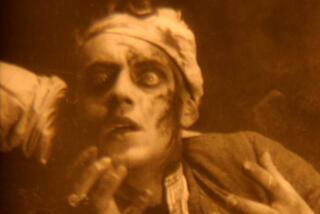A War Memorial in the Mind HEY JACK!<i> by Barry Hannah (Dutton/Seymour Lawrence: $15.95; 133 pp.) </i>
- Share via
In the white hell of winter warfare in Korea, Homer, the narrator of “Hey Jack!” thought of going back to the Mississippi heat, girls and tennis games. But war is a universal condition, and once you have seen it, you recognize it anywhere, any time.
The recognition drives the narration of Barry Hannah’s compelling novella. Years after the dreadful fighting around the Chosen Reservoir, the musty smell of an old book at an antiquary’s shop brought the deaths back to Homer and sent him into a brief breakdown.
Now, still later, a writer in a Mississippi college town, successful and well-off, in love with a vital and lovely woman whom he is about to marry, Homer’s nostrils flare for the odor that seeps up everywhere.
“Hey Jack!” is a casting-about among the stories and lives that Homer knows in his town. He is like a man on a dark night, who wheels under the stars to find his bearings; only to realize that stars are not the calm beacons of anthropocentric tradition, but churning infernos. Nobody is safe, and love decays.
“Hey Jack!” is a lethal kaleidoscope. Homer starts right off with the grotesques, whose extravagant extremes are squarely in the Southern tradition of William Faulkner and Flannery O’Connor.
There is the dentist, an assertive racist whose certainty of being on top never recovers from the sudden departure of the two black hired hands on his farm. Before they go, they turn the hogs loose to devour the potato crop and, right afterwards, to founder from overeating. Shaken, the dentist goes to a distant town to consult the psychiatrist, only to find that the real demon tormenting him is a shadow of homosexual inclination.
There is a failed professor, who sets his house and books on fire. There is the professor’s daughter, ravaged by drugs. There is Ronnie Foot, a local boy who becomes a rock star and returns home to house his slovenly and half-mad family in a new-built mansion. The grandfather spends the day pushing chickens out of a top-story window and shooting them on the ground with a .22 rifle.
There is a truck driver who turns to art and, eventually, to junk art. He is overwhelmed and maddened; there is no limit to the junk he finds on the American roadside, his task is infinite. Another artist, also a Korean-War veteran, sends death threats to painters who are more successful than he is.
Homer obsessively collects and recounts these stories. With equal and suspicious vehemence, he lays out his own store of prowess and contentment. There is his recognition as a writer, a fishing expedition, a hell-for-leather motorcycle trip to the Gulf and back.
Most of all, there is the woman he lives with and later marries. She is blond, spunky, sensible and sexy, with “active and helpful legs.” He tells of his uxorious contentment with a frightening insistence. He never names her; he hardly even sees her. Happiness, for the man who has never recovered from war, is something you clasp without reaching.
It is with Jack, in fact, that Homer’s hopes for reconciliation rest. Jack is quiet and dignified. He has been in the war--World War II--and he has been a sheriff. He has lived with violence 1634624544taught at college, studied French and German, operated a farm. Now he runs a coffee shop. It is a haven, frequented by college students and townspeople, and it exudes the kind of reassurance that a man of character can impart to a bar or a restaurant.
Jack is an old Southern ideal: warrior, farmer, scholar, a man of measure and justice. Homer finds peace in his company.
But peace is an illusion. Jack’s daughter, Alice, a restless 40-year-old teacher, fed up with her husband’s middle-age spread and outlook, goes to live with the rock singer, Ronnie. Jack is consumed by blind hatred for the man he knows to be an empty-headed destroyer.
What happens is seemingly farce. Homer preempts Jack’s .38 caliber revolver. When he scouts out the rock singer’s house, he encounters a fusillade of small-bore shots; the grandfather is peppering his chickens. Homer shoots out a window, scaring the old man out of his one or two wits. Later, Homer and Jack go to a nearby golf course and bombard the house with golf balls. “Old Gramps thought it was some eggs come back for revenge,” Alice reports afterwards.
Revenge is accomplished, apparently harmlessly. But Hannah invests the comedy with a murderous quality. The infection of war is as real as if real killing had taken place. Jack, the measured man, is as vulnerable to it as any of the grotesques.
There is a blood-letting, in fact, but it is almost incidental. Later, when Homer encounters Jack, bereaved and suddenly aged, on the golf course, the older man is like a disembodied monument to a war nobody can escape. “They gave me and you a certain hell, Homer,” he says. “They made us know everything.”
Hannah’s writing is dappled; sometimes terse and sometimes expansive. Homer’s wandering cogitations, his tales, his pleasures and his anguish all ramble to a purpose. They test and reveal the tensile strength of a cord that is never really loosed; that binds him to his deadly memories, that binds his Southern community and perhaps all communities to their own.
More to Read
Sign up for our Book Club newsletter
Get the latest news, events and more from the Los Angeles Times Book Club, and help us get L.A. reading and talking.
You may occasionally receive promotional content from the Los Angeles Times.










